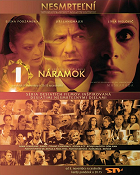Episodios(10)
-
Náramok (E01)
-
Ľúbi neľúbi (E02)
-
Ema B. (E03)
-
Fejs (E04)
-
Diabol (E05)
-
Kontrola (E06)
-
Dlhá cesta domov (E07)
-
Kvety a Lucia (E08)
-
Hon na legendu (E09)
-
Projekt Alfa (E10)
Reseña del usuario NinadeL de esta serie (10)
Náramok (2010) (E01)
This episode works with the motifs of Lermontov's "Masquerade." So far, I can only compare it to Willi Forst's similarly loose adaptation of Masquerade in Vienna (1934) and it swallowed me up. Langmajer may not be Wohlbrück, but at least Podzámská is beginning to be worthy of comparison with Tschechová.
()
Ľúbi neľúbi (2010) (E02)
This episode is inspired by the only book I can stand by Austen - "Sense and Sensibility." In this case, I am equipped with not only the classic version with Kate Winslet (1995), but also the Tamil version with Aishwarya Rai - Kandukondain Kandukondain (2000). Taken together, I find the setting in southern India or western Slovakia very imaginative and very effective, but it also does not detract from Austen's morality and energetic belief in a lifetime encounter with love. Katarina Šafaříková's transformation deserves extra attention.
()
Ema B. (2010) (E03)
This episode very aptly set Flaubert's modern-day Madame Bovary in a satellite town full of rich people with no real income.
()
Fejs (2010) (E04)
This episode radically sets Rostand's Cyrano of Bergerac in a hip hip club environment, and if it weren't for some clichés (years later Roxana's friend became a mother several times over, and although she wasn't pretty, her boyfriend has a new happy relationship that "coming out" didn't hurt, and of course, the gypsy who struggled with neo-Nazi failures is now releasing one successful album after another), it would have been great. Kristína Svarinská, who has already proved a lot in other series, stands out as an actor. I have no reason not to be happy with the classic adaptation with the reigning Gérard Depardieu (1990) and not be satisfied with both, as each can deliver a quality experience.
()
Diabol (2010) (E05)
This episode is, unfortunately, too contrasting, building on the suffocating atmosphere of Tolstoy's novel, giving even the likes of Zuzana Norisová an unusual role against her established type, and giving Kukura the opportunity to capitalize on his inner demon. However, Éva Vica Kerekes, an actress whose popularity grows in direct proportion to the number of times she undresses in front of the camera, gets just as prominent a role here. Where less would suffice, there is the maximum, and where it would be appropriate to add some pressure, there is nothing. That’s too bad.
()
Kontrola (2010) (E06)
This episode is, unfortunately, a very weak episode, perhaps also because Gogol is too inflected an author and here any ironic note was missing and everything was too heavy-handed.
()
Dlhá cesta domov (2010) (E07)
This episode was a very pleasant novelty for me because I have absolutely no experience with Slovak classics. The nicely playful solution to the problems of two married couples on a shared floor is complemented by meaningful commentary, good jokes, and a downright well-fitting soundtrack. Ideal inspiration for reading.
()
Kvety a Lucia (2010) (E08)
This episode is perfection itself, which I return to regularly and can never get enough of. A perfect variation on "The Lady of the Camellias" with an acting concert by Kanócz, Hilmerová, Kňažko and Geišberg. I also enjoyed Koleník... A perfectly balanced, wonderfully atmospheric and chilling melodrama. I even like it better than the same theme in Greta Garbo's Camille (1936) and it is comparable to the first version of Garbo (1927).
()
Hon na legendu (2010) (E09)
This episode is a great allegory for hell on earth. Images of aridity, decay, and ruin in the shadow of the endless struggle for glory are subordinated to the wonderfully dark Kramár and Noga. Moreover, in the context of the fact that otherwise I associate Don Juan only with DeMarco (1995), this one definitely wins all the way.
()
Projekt Alfa (2010) (E10)
The episode perfectly combines Stevenson's classic with postmodern visuals and provides another great acting opportunity to Noga. I don't have the slightest reservations about it. What to recommend for comparison from the last hundred years? My favorite is Mary Reilly (1996), but otherwise, the most varied selection of adaptations is available in the 1910s to the 1940s. Between then and Mary, the topic was too devalued.
()

